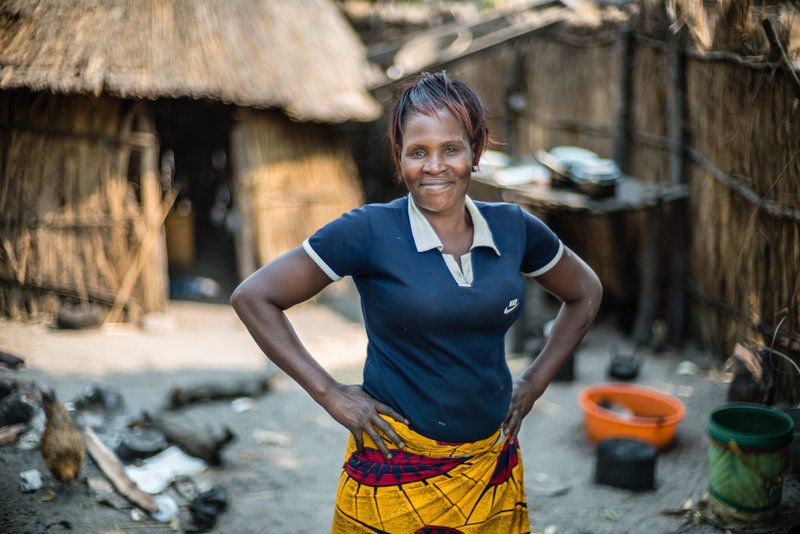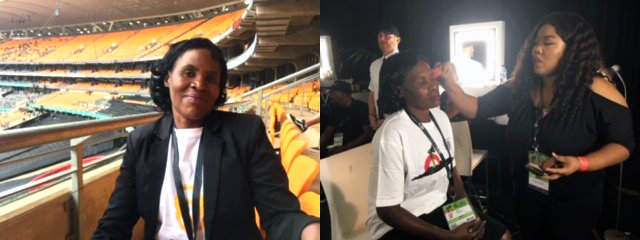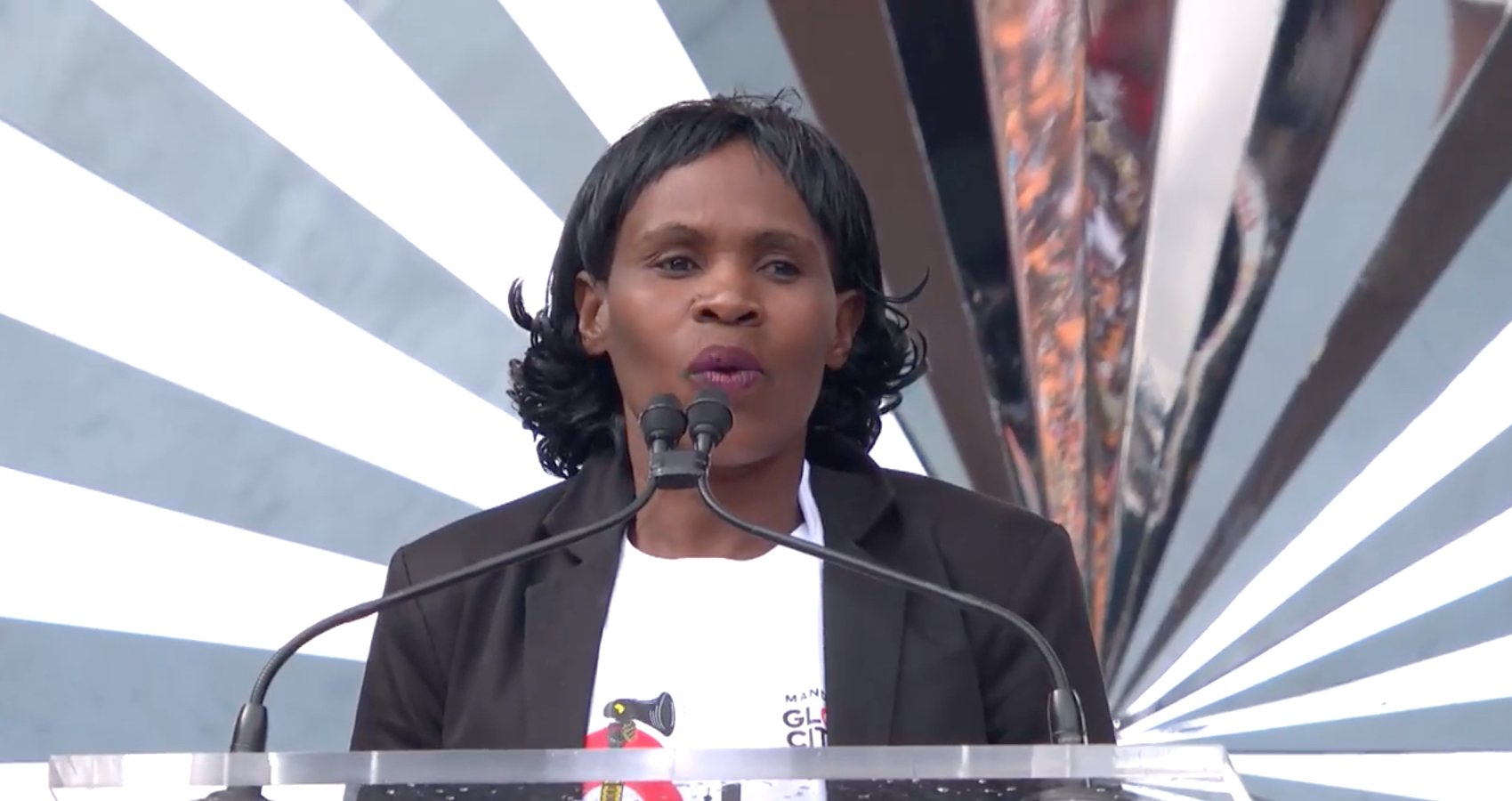
Meet Precious Mukelabai – a woman who travelled outside her country, Zambia, for the first time in December 2018. For that journey, she also obtained a passport for the first time in her life and travelled on a plane for the first time.
And then she walked onto a stage, in a Johannesburg stadium that hosted the World Cup, to speak live to millions of people – without a trace of nerves.
The first picture of the volunteer community health worker, above, sees her standing outside her home in a tiny village in western province Zambia, near the border with Angola. Precious – she is a woman you can quickly make friends with and get on to first name terms – is the only person in her village, called Malumba, with a phone.
It is a poor village situated on the floodplain of the Zambezi River. In the dry season the track that leads to Malumba village, from a rare tarmac road in the region, is impassable except in a powerful Four-Wheel Drive. The sand is soft and deep.
In the rainy season, as the mighty Zambezi spreads across the plain, the sand becomes deep, gloopy mud. Again, the only way through is in a high-end vehicle.
Malumba is isolated. There is no electricity, no permanent health post and only rare government services.
It does have some magnificent, twenty-metre high mango trees which provide welcome shade and, once a year, a bonanza of fruit. But otherwise Malumba is a tough place to live. Most of the women, including Precious, are subsistence farmers and widows;
“I never grow enough to sell any in the market”, said Precious Mukelabai, standing by her 10m x 10m plot of sweet potatoes, maize and the root vegetable cassava;
“I need it all to feed my two daughters and I”.
Her two sons, older than the girls, have left the village to look, without much luck, for work.
Many of the men in Malumba are seasonal fishermen. Precious’ husband, like so many others, drowned in a fishing accident in 2007.
It’s in villages like these, mostly in Africa, South Asia and Latin America that “neglected tropical diseases” (a phrase coined to distinguish them from better-known illnesses like malaria) thrive. They include afflictions such as blinding trachoma, the leading cause of infectious blindness in the world, and sleeping sickness, which in its latter stages attacks the brain and is almost always fatal.
Neglected tropical diseases maim and kill and are found in places where there is no clean water or adequate sewerage systems. They arise from, and cause, poverty. They thrive where there are flies and other carriers of parasites which cause the diseases. Some 1.5bn people – one in five of us on earth – live in areas where these diseases are endemic.
As the only person in Malumba with a phone, Precious is a lifeline to the outside world. She stays in touch with the occasional government health workers or aid agency staff that pass through her area and seeks help for her community.
She travelled from her village to address a Global Citizen festival in Johannesburg on a ticket given to her by a global health, Uniting to Combat Neglected Tropical Diseases, which seeks to raise awareness of these diseases of poverty.
The festival was a mixture of music – from the likes of Beyonce and the Nigerian star Femi Kuti – with speeches and financial pledges from politicians and others on the sustainable development goals.
This ingenious formula, organised by the advocacy movement, Global Citizen, sees politicians and businesspeople flock to share a platform with superstars and address an engaged audience of young activists and voters. The South African President, Cyril Ramaphosa, for example, welcomed Beyonce onto the stage. The Prime Minister of Mozambique, Carlos Agostinho do Rosário promised $6m for neglected tropical diseases.

When Precious Mukelabai first saw the stadium in Johannesburg where she was going to speak, she was mightily impressed. But who wouldn’t be? The FNB Stadium in Soweto, Johannesburg, is a top class venue that hosted the World Cup.
She was unfazed;
“The speaking will not be difficult”, she said, before the seats started filling up with tens of thousands of young South Africans. She added, rather incongruously given the magnificent setting;
“I speak to people in my village all the time.”
And so it was.
After a dab of face powder – from the same make-up artists who helped the superstars – Precious walked onto the stage. She had had a short practice the day before. That was the first time she had seen a teleprompter – the machine that shows a scrolling script onscreen.
Now, on the day itself, this was certainly the first time she had gone live in a telecast to millions around the world.
“My Auntie, Matakale Inonge, got blinding trachoma”, Precious almost shouted at the crowd;
“It made her eyelashes turn inwards and scratch her eyes; she was going blind”
Blinding trachoma is a cruel disease which causes pain every time you blink. After a while the inturned eyelashes scratch the cornea and this eventually leads to blindness. The treatment to prevent avoidable blindness from trachoma with drugs, costs less than 50 US cents per person. The surgery to reverse painful, in-turned eyelashes, is relatively cheap as well.
Around 165 million people need treatment to prevent trachoma. About half have received it. But many still need help.
“I’m the only person in my village with a phone”, Precious continued, holding her head high as she read from the distant teleprompter half way across the stadium;
“I helped put Auntie in touch with an eye surgeon, Bruno Kandei. He operated on Aunties’s eyes. It only took fifteen minutes.”
The surgery by the Zambian Bruno Kandei was successful.
Precious’ aunt, Matakale Inonge, was saved from going blind.
A community health worker – an unpaid volunteer – had shared a stage with Cyril Ramaphosa and Beyonce to tell the world that ending neglected tropical diseases could be done.
